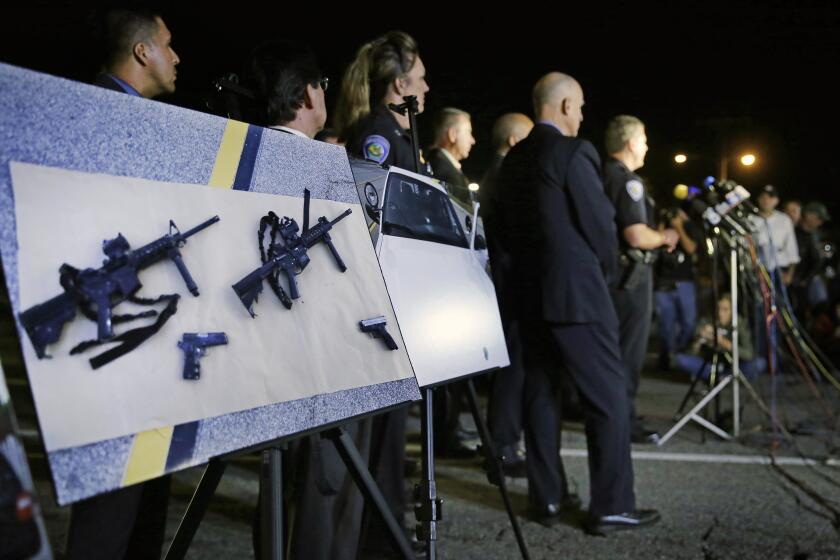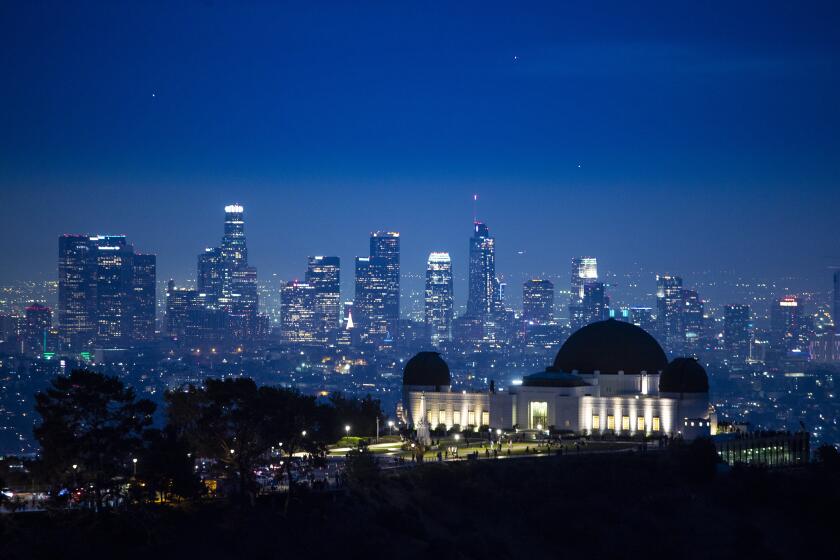9th Circuit ruling threatens California ban on unlicensed open carry of handguns

- Share via
California laws banning people from openly carrying handguns in public without a license are under greater legal threat after a federal appellate court decision Thursday.
A conservative three-judge panel of the U.S. 9th Circuit Court of Appeals found that a lower court “abused its discretion” when it declined to halt state enforcement of the laws while their constitutionality is being challenged.
The higher court’s ruling did not conclude that enforcement should be halted, instead sending the case back down to the lower district court for another analysis. However, it did provide “instructions” on how that analysis should be conducted, with language that will make it more difficult for the state to prove its laws are constitutional, legal experts said.
“The court seems to think that California can’t meet this burden,” said Jake Charles, an associate professor at Pepperdine Caruso School of Law and an expert in firearms law.
Amy L. Bellantoni, an attorney for Mark Baird and Richard Gallardo, the plaintiffs who brought the lawsuit challenging the state’s laws, said they were “very pleased” with the decision and “look forward to a swift reevaluation by the district court.”
California Atty. Gen. Rob Bonta’s office, which is defending the state’s laws in court, said in a statement that it was “reviewing the decision and will respond appropriately.” The statement added that it is “important to note that criminal penalties for the unlicensed open carry of firearms remain in effect.”
The case — Baird vs. Bonta — is one of many challenges to California gun laws that got a major boost after the U.S. Supreme Court ruled last year that firearm restrictions violate the 2nd Amendment if they aren’t deeply rooted in the nation’s history or analogous to some historical rule.
The “Bruen test,” as it has become known after the case New York State Rifle & Pistol Assn. vs. Bruen, radically altered the legal process by which gun regulations are scrutinized when individuals challenge them as unconstitutional. Rather than considering the public good of such gun laws, courts are now weighing whether laws aimed at governing modern firearms like assault rifles are sufficiently similar enough to centuries-old weapons laws to be considered historical and therefore constitutional.
Thanks to the Supreme Court, cases challenging California’s gun laws have been focused more on distant history than the weapons’ modern threat.
California generally bars people who live in counties with more than 200,000 residents from openly carrying handguns, though there are some exceptions. People who live in jurisdictions with fewer than 200,000 residents, such as Baird and Gallardo, can apply for open-carry licenses from local law enforcement, but such licenses are also difficult to obtain.
Baird and Gallardo first sued over the laws more than four years ago, alleging they violate their 2nd Amendment right to bear arms for self-defense.
In his decision Thursday, Circuit Judge Lawrence VanDyke, a Trump appointee, wrote that the lower court must consider the likelihood that Baird and Gallegos would ultimately prevail in their claim that the bans are unconstitutional.
However, the lower court did not do that, VanDyke wrote. Instead, he said, it simply denied the injunction on the grounds that it could “endanger public safety” by temporarily depriving California of its “primary means of limiting public handgun carrying to ‘ordinary, law-abiding citizens.’”
VanDyke wrote that if the lower court determines that California’s licensing laws impact rights covered by the 2nd Amendment, the lower court must then apply the Bruen test.
Legal experts said that if VanDyke had stopped there, the decision would have been less important than procedural. However, they said, VanDyke went a step further by offering a standard for how California might meet Bruen’s requirements that was even stricter than what the Supreme Court articulated.
With Bruen, the Supreme Court said that gun laws are legitimate only if they existed or are sufficiently similar in some way to laws that existed in 1791, when the 2nd Amendment was passed, or 1868, when the 14th Amendment was passed. The latter amendment prohibits states from depriving people of property without due process of law.
The Bruen decision was sufficiently vague that judges have been interpreting it in different ways since. Many are closely watching a case the Supreme Court will hear soon that deals with laws restricting gun possession by domestic abusers, to see if the nation’s high court will provide any additional instructions on how to apply Bruen.
Conservative judges have generally applied Bruen more strictly than liberal ones, and VanDyke’s ruling Thursday was no exception.
VanDyke wrote that because states were already grappling with gun violence in 1791 and 1868, California had to show a “distinctly similar” historical law to its current open-carry laws in order for the latter to be constitutional today — and not just “any general firearm regulation California might unearth” from the past.
He said the historical law must be similar in “how” and “why” it “curtailed individuals’ right to carry firearms” in order to be relevant in the current case.
Citing other strict applications of Bruen in appellate courts elsewhere in the country, VanDyke wrote that “in short,” California “must identify a historical analogue that curtails the right to peaceably carry handguns openly for self-defense to a comparable degree, with a comparable severity, and with a comparable blanket enforcement to California’s open-carry ban.”
VanDyke was joined in his ruling by circuit judges N. Randy Smith, who was appointed by President George W. Bush, and Kenneth K. Lee, a Trump appointee.
Adam Winkler, a UCLA law professor who focuses on 2nd Amendment law, said the ruling clearly shows the way things are trending with gun laws in the post-Bruen era.
“It’s getting harder and harder for legislators to defend gun safety laws,” he said.
Bellantoni, the attorney for Baird and Gallardo, said California’s open-carry bans have no basis in history and should be overturned.
“California’s open-carry regulations are repugnant to the plain text of the 2nd Amendment and a preliminary injunction should follow,” she said.
VanDyke urged the lower court to “swiftly” reconsider and rule on the injunction request given the underlying litigation is already more than four years old and the Bruen decision was issued more than a year ago, but he did not set a specific deadline.
Thursday’s decision could be appealed, as could any new decision by the lower court.
More to Read
Sign up for Essential California
The most important California stories and recommendations in your inbox every morning.
You may occasionally receive promotional content from the Los Angeles Times.












